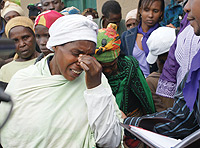Fifteen years on and barely a day goes by without some memory springing to minds of people like Beata Nakore. Her dilemma stems from the tragic effects as a result of the horrible acts and brutality that characterised the 1994 Genocide against the Tutsi.


Fifteen years on and barely a day goes by without some memory springing to minds of people like Beata Nakore. Her dilemma stems from the tragic effects as a result of the horrible acts and brutality that characterised the 1994 Genocide against the Tutsi.
She was abducted by Interahamwe militia as they surrounded a neighbouring school and church where Nakore struggled to join fellow defenceless Tutsi targets seeking refuge.
She remembers how a few reasonably young girls and women including herself were separated from the rest of the people before the two facilities in which they were hiding were set ablaze.
This was in Gitumba sector (former Kibirira commune), Ngororero district in the Western province where like in Bugesera district, Genocide is said to have started long before 1994.
Most of them were raped and infected with HIV/Aids and that’s exactly the reason why Nakore’s life is imbalanced.
Despite the tears that occasionally well up in her eyes as she publicly tells the horror that befell her for the first time, Nakore counts herself ‘ lucky’ to have survived lynching during the dark period in which over one million innocent lives were lost.
"My three children had already escaped with their father as we were forced from Kigali back to the village when the killings intensified,” she said.
She vividly remembers that on the evening of April 6, 1994, when the plane carrying former President Juvenal Habyarimana was shot down over Kigali, she was in Nyamirambo, a Kigali suburb.
It’s from there days later that the family separated after deciding to move back to the village to a safer haven but little did they know it was like jumping out of the frying pan to the blazing fire.
Back home, dead bodies strewn along the roads had become a familiar view. The face with which she stares back at you unlike during happier times clearly tells you everything you need to know about why the events of April 1994 and the number of people who died will never ever be forgotten, but must never happen again.
All through the Genocide, Nakore hid in a bush near a swamp until she heard a call of life from the RPF soldiers who had advanced to liberate the country.
"After the soldiers exerted pressure and the killers escaped, we had the courage to get out of the bushes and fortunately I discovered my husband had survived with the children,” said Nakore.
Through sorrow and heartless behaviour, the once happy family reunited again but the expected joy and delight that comes with reunion was not to last long.
She got pregnant and gave birth to a daughter who is now twelve years old but upon disclosing her HIV status to the husband, the stable relationship took a turn for the worse.
"My husband left me upon discovering that I was positive and now I have to single handedly fend for our four children. As if that is not enough, the person in whose house I have been living has also evacuated me,” she said.
Nakore who practically possesses nothing currently lives in Chobe estates in the same district where her life faced torment fifteen years ago and mere sight of the church and school where her neighbours were burnt, brings back the sad memories.
As hell broke loose in what she describes as a tragic total waste of human life, the rest of the world looked on and like most people have asked, she also wonders if it could all have been avoided and for her the answer is a resounding, ‘Yes!’
"I am not blaming the neighbours who killed our relatives because there was a complete breakdown in organisation at a higher level that led to the eventual whitewash verdict of death for the innocent victims,” the 41 year old said.
During the commemoration of the country’s worst ethnic disaster, Nakore with much difficulty recounts the souls whose hopes and dreams for the future ended then.
Collectively they’ve become known as the victims of the Genocide but to the families and friends they left behind, they were a dad, a son, a brother and a sister; a cousin, an auntie, an uncle and a grandad; a boyfriend, a husband, a soul mate and a best friend.
Ends


